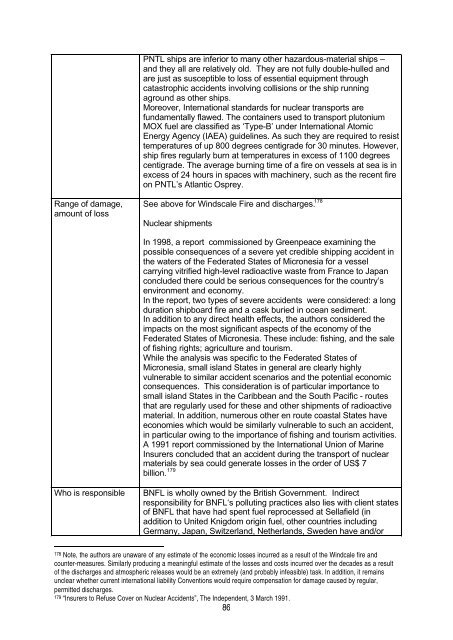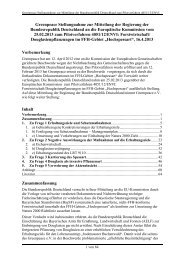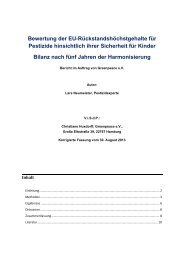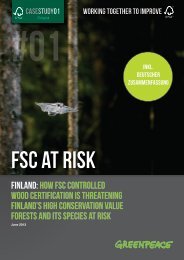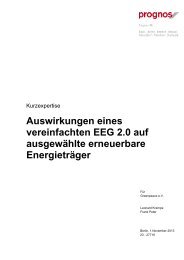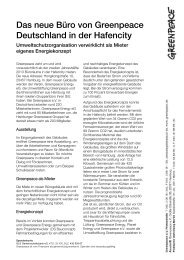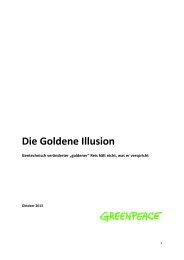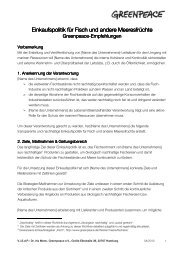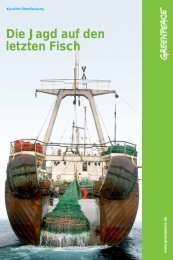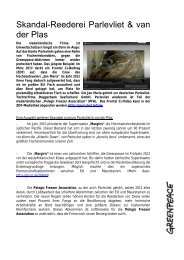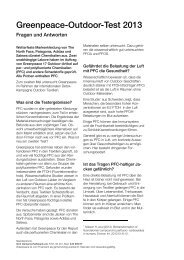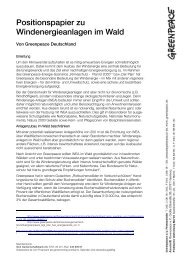Umweltverbrechen multinationaler Konzerne - Greenpeace
Umweltverbrechen multinationaler Konzerne - Greenpeace
Umweltverbrechen multinationaler Konzerne - Greenpeace
Erfolgreiche ePaper selbst erstellen
Machen Sie aus Ihren PDF Publikationen ein blätterbares Flipbook mit unserer einzigartigen Google optimierten e-Paper Software.
Range of damage,<br />
amount of loss<br />
PNTL ships are inferior to many other hazardous-material ships –<br />
and they all are relatively old. They are not fully double-hulled and<br />
are just as susceptible to loss of essential equipment through<br />
catastrophic accidents involving collisions or the ship running<br />
aground as other ships.<br />
Moreover, International standards for nuclear transports are<br />
fundamentally flawed. The containers used to transport plutonium<br />
MOX fuel are classified as ‘Type-B’ under International Atomic<br />
Energy Agency (IAEA) guidelines. As such they are required to resist<br />
temperatures of up 800 degrees centigrade for 30 minutes. However,<br />
ship fires regularly burn at temperatures in excess of 1100 degrees<br />
centigrade. The average burning time of a fire on vessels at sea is in<br />
excess of 24 hours in spaces with machinery, such as the recent fire<br />
on PNTL’s Atlantic Osprey.<br />
See above for Windscale Fire and discharges. 178<br />
Nuclear shipments<br />
In 1998, a report commissioned by <strong>Greenpeace</strong> examining the<br />
possible consequences of a severe yet credible shipping accident in<br />
the waters of the Federated States of Micronesia for a vessel<br />
carrying vitrified high-level radioactive waste from France to Japan<br />
concluded there could be serious consequences for the country’s<br />
environment and economy.<br />
In the report, two types of severe accidents were considered: a long<br />
duration shipboard fire and a cask buried in ocean sediment.<br />
In addition to any direct health effects, the authors considered the<br />
impacts on the most significant aspects of the economy of the<br />
Federated States of Micronesia. These include: fishing, and the sale<br />
of fishing rights; agriculture and tourism.<br />
While the analysis was specific to the Federated States of<br />
Micronesia, small island States in general are clearly highly<br />
vulnerable to similar accident scenarios and the potential economic<br />
consequences. This consideration is of particular importance to<br />
small island States in the Caribbean and the South Pacific - routes<br />
that are regularly used for these and other shipments of radioactive<br />
material. In addition, numerous other en route coastal States have<br />
economies which would be similarly vulnerable to such an accident,<br />
in particular owing to the importance of fishing and tourism activities.<br />
A 1991 report commissioned by the International Union of Marine<br />
Insurers concluded that an accident during the transport of nuclear<br />
materials by sea could generate losses in the order of US$ 7<br />
billion. 179<br />
Who is responsible BNFL is wholly owned by the British Government. Indirect<br />
responsibility for BNFL‘s polluting practices also lies with client states<br />
of BNFL that have had spent fuel reprocessed at Sellafield (in<br />
addition to United Knigdom origin fuel, other countries including<br />
Germany, Japan, Switzerland, Netherlands, Sweden have and/or<br />
178 Note, the authors are unaware of any estimate of the economic losses incurred as a result of the Windcale fire and<br />
counter-measures. Similarly producing a meaningful estimate of the losses and costs incurred over the decades as a result<br />
of the discharges and atmospheric releases would be an extremely (and probably infeasible) task. In addition, it remains<br />
unclear whether current international liability Conventions would require compensation for damage caused by regular,<br />
permitted discharges.<br />
179 “Insurers to Refuse Cover on Nuclear Accidents”, The Independent, 3 March 1991.<br />
86


